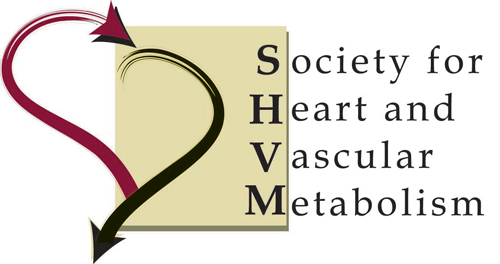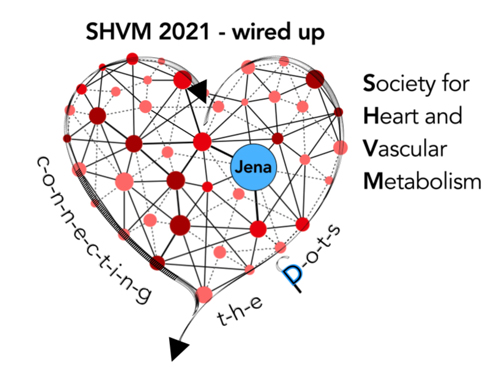
SHVM 2021
Metabolism at the crossroads of health and disease







All times shown in the programme are
Right now, it is HH:mm (dd mmm 'YY) in Jena.
This meeting will be attended by people from 28 different countries spread across 17 time zones! Please plan your attendance carefully, taking into consideration that all times shown in the programme below are German times (CEST).
14:00-14:30
Registration & Welcome
14:30-15:30
Keynote Lecture 1
Chair: Torsten Doenst (Jena, Germany)
Howy Jacobs (Tampere, Finland)
Fahrenheit 101 - mitochondria are not as cool as we imagined
15:30-16:30
Session 1
Chairs: Estelle Heyne (Jena, Germany) & Howy Jacobs (Tampere, Finland)
15:30-15:50
Anne Garnier (Chatenay-Malabry, France)
Metabolic and non-metabolic effects of the cardiac inducible deletion of AMPKalpha2 in male and female mice
15:50-16:10
Zoltan Arany (Philadelphia, PA, USA)
Extra-cardiac BCAA catabolism lowers blood pressure and protects from heart failure
16:10-16:20
Short talk: Jan Dudek (Würzburg, Germany)
Altered amino acid metabolism in response to dysfunctional mitochondria in Barth Syndrome cardiomyopathy
16:20-16:30
Short talk: Ujang Purnama (Oxford, United Kingdom)
Activation of HIF-1α rescues the hypoxic response and reverses metabolic dysfunction in the diabetic heart
16:30-17:00
Tech Advances 1
Chair: Marten Szibor (Jena, Germany) & Tímea Komlódi (Innsbruck, Austria)
16:30-16:45
Moa Persson (Symcel, Sweden)
Measuring metabolism through isothermal microcalorimetry and how it can help to reveal novel and crucial insights on cellular response
16:45-17:00
Claudia Prothmann (Merck Chemicals GmbH, Germany)
Synthetic CRISPR – a fast, flexible and customizable solution for difficult to transfect cells
17:00-17:15
Break
17:15-18:15
Session 2
Chairs: Josh Butcher (Stillwater, OK, USA) & Benjamin Lauzier (Nantes, France)
17:15-17:35
Natascha Sommer (Giessen, Germany)
The role of the mitochondrial respiratory chain in oxygen sensing and signal transduction in hypoxic pulmonary vasoconstriction
17:35-17:55
José López-Barneo (Seville, Spain)
The role of the mitochondrial respiratory chain in acute oxygen sensing in arterial chemoreceptors
17:55-18:05
Short talk: Stephanie Kereliuk (Winnipeg, Canada)
Multi-omics profiling implicates impaired mitochondrial oxidative metabolism as a mechanism of cardiometabolic disease development in rat offspring exposed to gestational diabetes
18:05-18:15
Short talk: Leigh Goedeke (New Haven CT, USA)
SGLT2 inhibition promotes myocardial ketone utilization in the normal and failing heart
18:15-18:45
Tech Advances 2
Chair: Adam Wende (Birmingham, AL, USA)
18:15-18:30
Werner Kammerloher (Agilent Technologies, Germany)
Using Seahorse Assays to measure the cellular energy metabolism in cardiovascular research
18:30-18:45
Erich Gnaiger (Oroboros Instruments, Austria)
Coenzyme Q redox state and high-resolution respirometry: Novel perspectives for mitochondrial diagnostics
18:45-19:00
Break
19:00-20:00
Session 3
Chairs: Qutuba Karwi (Alberta, Canada) & Christine Des Rosiers (Montreal, Canada)
19:00-19:20
Hyoung Kyu Kim (Busan, Korea)
A novel cardiac contractility regulator in energy metabolism and calcium signaling
19:20-19:40
Lisa Heather (Oxford, United Kingdom)
Targeted rescue of dysfunctional energetics in the diabetic heart
19:40-19:50
Short talk: Mathieu Panel (Montpellier, France)
Impaired mitochondrial calcium homeostasis at the early stage of the diabetic cardiomyopathy
19:50-20:00
Short talk: Edgar Nollet (Amsterdam, The Netherlands)
Mitochondrial dysfunction and metabolic profiling in septal myectomy tissue of patients with obstructive hypertrophic cardiomyopathy
20:00-open end
ePoster session
14:00-14:30
Outlook 2022
Chair: Helen Collins (Louisville, KY, USA)
The next organising committee
Teaser presentation of the upcoming meeting in Seoul 2022
14:30-15:30
Keynote Lecture 2
Chair: Véronique-Anne Lacombe (Oklahoma City, OK, USA)
Deborah Muoio (Durham, NC, USA)
Metabolic flexibility and mitochondrial gridlock
15:30-16:30
Session 4
Chairs: Christina Schenkl (Jena, Germany) & José Antonio Enríquez (Madrid, Spain)
15:30-15:50
Satoaki Matoba (Kyoto, Japan)
Changes in cardiac metabolism during diabetes and heart failure
15:50-16:10
Lea M. Durham Delbridge (Melbourne, Australia)
Cardiac adventures in glycophagy – a novel metabolic defect in diabetic cardiomyopathy
16:10-16:20
Short talk: Mark Pepin (Heidelberg, Germany)
The δC isoform of Ca2+/calmodulin-dependent protein kinase II regulates pressure overload-induced reprogramming of cardiac metabolic substrate switching in mice
16:20-16:30
Short talk: Julia Möllmann (Aachen, Germany)
The SGLT2 inhibitor ertugliflozin causes a switch of cardiac substrate utilization leading to reduced cardiac mTOR-signaling, unfolded protein response and apoptosis
16:30-17:00
Tech Advances 3
Chair: Marten Szibor (Jena, Germany)
16:30-16:45
Dieter Fuchs (FUJIFILM VisualSonics, Germany)
State of the Art for HF Ultrasound and Photoacoustics
16:45-17:00
Claudia Oerther (Bruker, Germany)
Preclinical cardiac MR imaging beyond your imagination
17:00-17:15
Break
17:15-18:15
Session 5
Chairs: Estelle Heyne (Jena, Germany) & Ilka Wittig (Frankfurt, Germany)
17:15-17:35
Luc Bertrand (Brussels, Belgium)
AMPK and O-GlcNAcylation, a novel metabolic partnership in cardiovascular diseases
17:35-17:55
José Antonio Enríquez (Madrid, Spain)
Heteroplasmy of wild type mitochondrial DNA variants in mice causes metabolic heart disease with pulmonary hypertension and frailty
17:55-18:05
Short talk: Sathya Velmurugan (Lexington, KY, USA)
Inhibition of Na+–glucose cotransporter 1 reduces arrhythmogenesis in diabetic rats
18:05-18:15
Short talk: Helena Kenny (Iowa City, IA, USA)
Cardiac specific deletion of the citrate carrier is associated with stress induced cardiac dysfunction
18:15-18:30
Break
18:30-20:00
Session 6
Chairs: Florin Despa (Lexington, KY, USA) & Terje Larsen (Tromsø, Norway)
18:30-19:30
Finalists of the "William C. Stanley" Early Investigator Awards, selected from pitches submitted by junior investigators
Kaitlyn Dennis (Oxford, United Kingdom)
Diabetic mitochondria are resistant to palmitoyl CoA inhibition of respiration, which is detrimental during ischaemia
Justine Dontaine (Brussels, Belgium)
AMPK and O-GlcNAcylation: a new paradigm to protect the failing heart
Velmurugan Gopal Viswanathan (Lexington, KY, USA)
Diabetic cardiomyopathy is partially reversed by knocking-down human amylin in mice with conditional expression of human amylin in the pancreatic β-cells
Estelle Heyne (Jena, Germany)
Exercise training but not high genetically determined exercise capacity alone is related to reduced cardiac ischemia-reperfusion injury
Qutuba Karwi (Alberta, Canada)
Branched-chain aminotransferase deletion worsens adverse remodelling in heart failure
Alice Marino (Brussels, Belgium)
Sodium myo-inositol cotransporter affects cardiac hypertrophy and fibrosis in pressure-overloaded mouse hearts
19:30-19:45
Online voting & awarding 3x "William C. Stanley" Early Investigator Awards
19:45-20:00
Concluding remarks
20:30-22:00
Reception for face-to-face participants